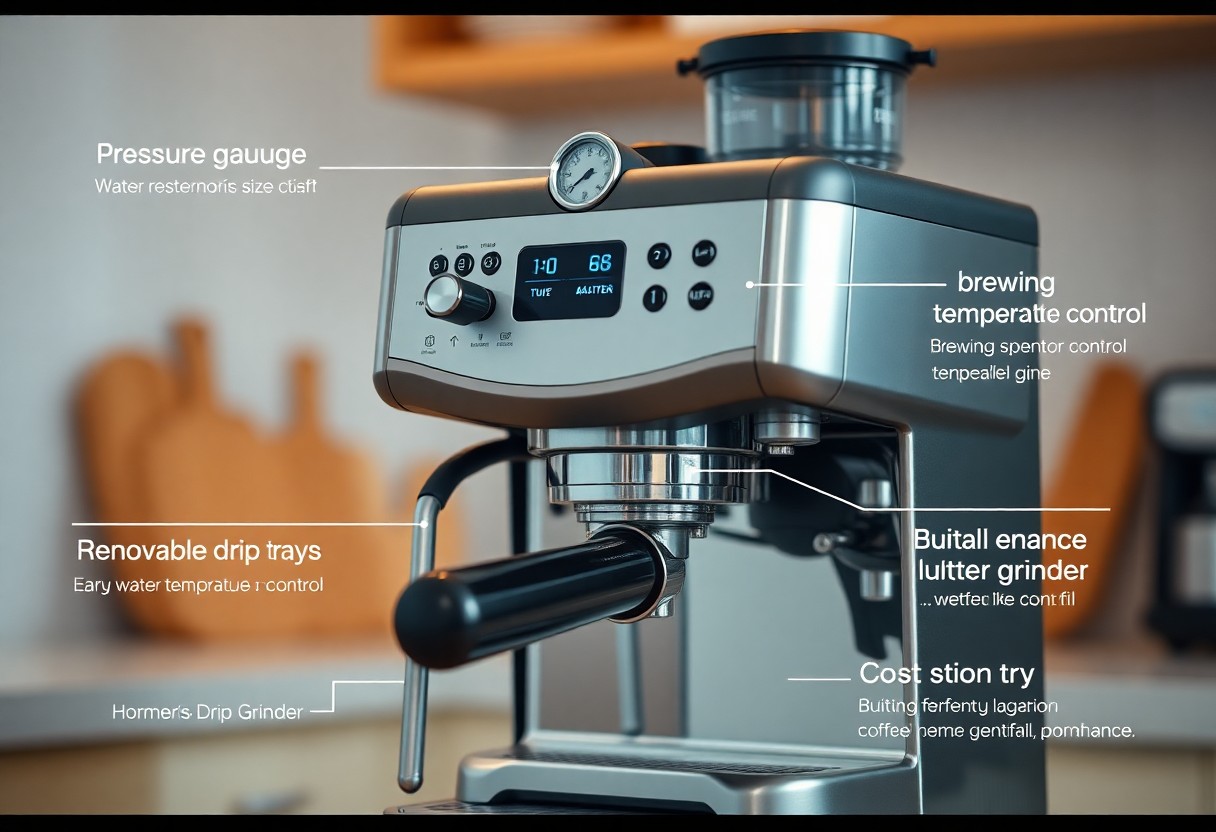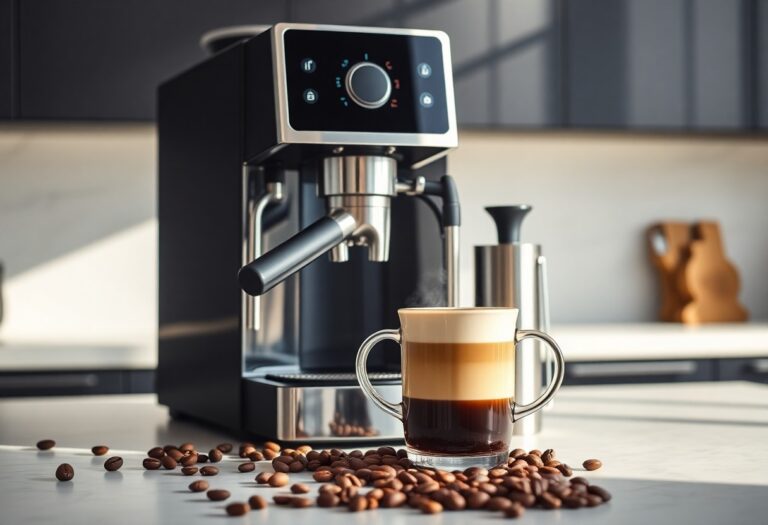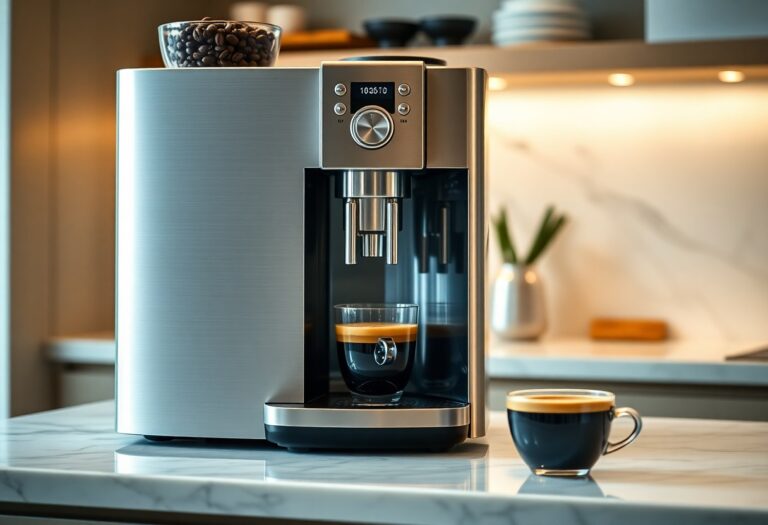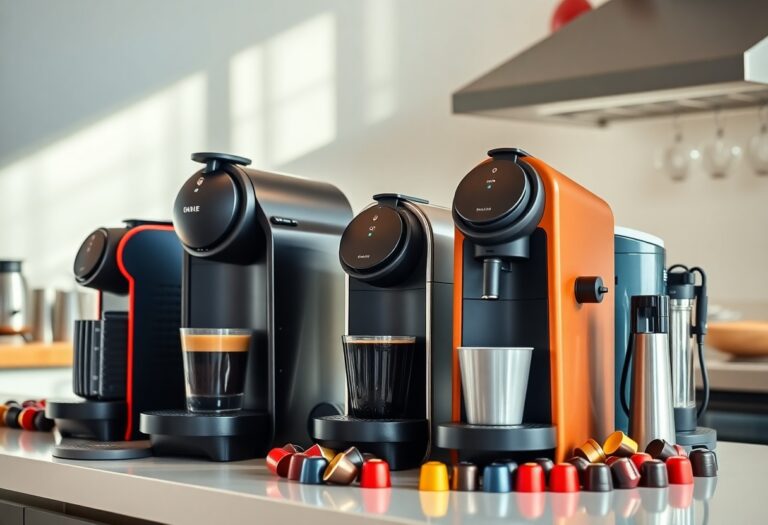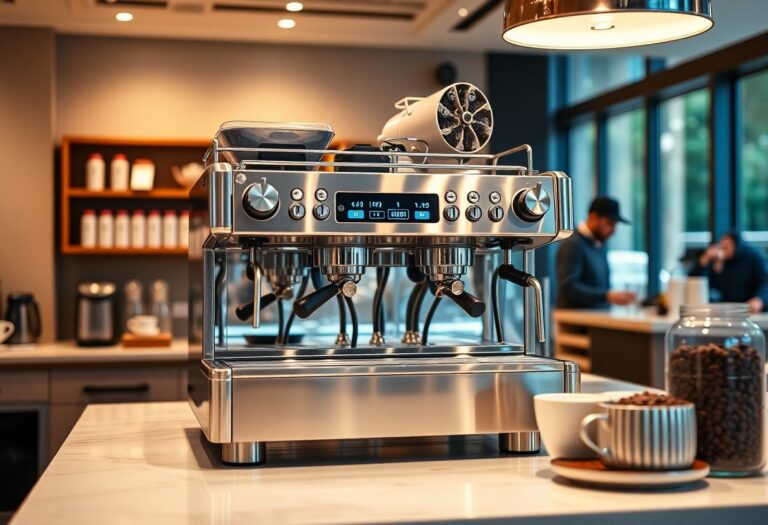What to Look for When Buying a Coffee Machine – Purchase Criteria
You want your coffee machine to enhance your daily brew, but navigating the options can be overwhelming. To make an informed decision, consider factors like brewing methods, which impact flavor, and capacity, depending on your household size. Check for ease of use and cleaning features to ensure it fits seamlessly into your routine. Don’t overlook durability and warranty options, as these can save you money in the long run. By focusing on these key areas, you’ll be well-equipped to choose the perfect coffee machine for your needs.
Key Takeaways:
- Consider the type of coffee machine that suits your brewing preferences, such as drip, espresso, or single-serve models.
- Evaluate the capacity of the machine to ensure it meets your household or personal consumption needs.
- Check for adjustable settings for grind size, brew strength, and water temperature to customize your coffee experience.
- Look into the maintenance requirements, such as ease of cleaning, descaling features, and availability of replacement parts.
- Assess user reviews and ratings to gain insights on performance, reliability, and long-term satisfaction from other buyers.
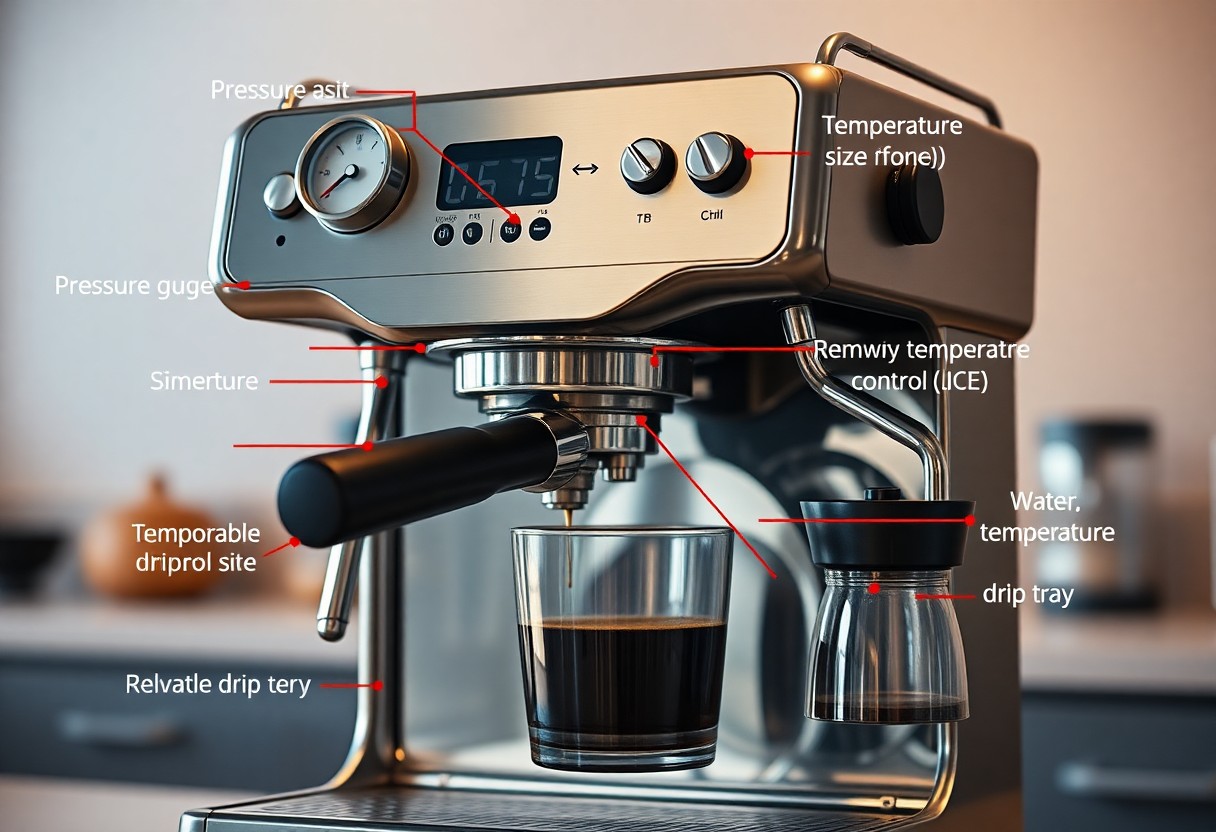
Deciphering the Coffee Machine Jargon
Understanding the terminology that comes with coffee machines can often feel overwhelming. From brewing methods to pressure gauges, each term carries its own significance in determining how your coffee is made. To make it simpler, consider referring to Everything You Need to Know About Buying a Coffee Maker. Knowing this lingo will empower you to make an informed decision when shopping for your next coffee machine.
Essential Terminology Explained
You’ll encounter various terms while searching for a coffee machine, and knowing their meanings can make a significant difference in your choice. Terms like brew strength control, which determines the intensity of your coffee, and pre-infusion, referring to the pre-wetting of coffee grounds before full brewing, are important to grasp. Understanding these phrases helps align your preferences with the right machine.
Common Features and Their Significance
Several common features can optimize your brewing experience. Look for options like programmable settings, which allow you to set your machine to brew at specific times, and automatic shut-off for safety and energy efficiency. Machines with built-in grinders can also save space and ensure fresh coffee grounds every time, significantly impacting flavor.
Assessing common features not only aids in enhancing your coffee experience but also influences convenience and safety. For example, machines equipped with thermal carafes can keep your coffee warm without a hot plate, preventing burns and preserving taste. Likewise, models that offer milk frothers or cold brew options open up a whole new realm of beverage possibilities. Delving into these features will help you select a coffee maker that aligns with your brewing habits and taste preferences.
The Taste Factor: Importance of Brewing Quality
Flavor is the heart and soul of your coffee experience. A high-quality coffee machine plays a significant role in ensuring that every cup you brew hits the right notes of flavor and aroma. Investing in a machine that prioritizes brewing quality will allow you to relish the intricacies of your chosen beans. For more in-depth insights, explore What to Look for When Buying an Espresso Machine.
Brew Methods: Espresso, Drip, and More
The method of brewing can drastically alter your coffee’s taste. Espresso machines force hot water through finely-ground coffee for a concentrated experience, while drip machines slowly percolate water, extracting flavors without the intensity of espresso. Your brewing preference will guide you in selecting the right machine that caters to your taste profile.
Flavor Extraction and Temperature Control
A machine that offers precise temperature control is necessary for optimal flavor extraction. Coffee extraction relies on the right temperature to dissolve the desired compounds without scalding the beans. Machinery that maintains consistent temperatures between 195°F and 205°F typically produces the best results. Understanding the extraction process can turn your home brew into a barista-level experience.
| Temperature Impact | Higher temperatures can lead to over-extraction, yielding bitter flavors, while lower temperatures may result in weak, under-extracted coffee. |
| Extraction Time | Espresso typically brews in 25-30 seconds, while drip brewing can take 4-6 minutes depending on the grind size and water flow rate. |
Attention to flavor extraction and temperature control can enhance your brewing experience. By understanding the relationship between heat and extraction time, you can manipulate these parameters to create the perfect cup. Choosing a machine that facilitates these adjustments will not just allow you to brew coffee but also explore the full spectrum of flavors that your beans have to offer.
| Extraction Methods | Different brewing methods optimize extraction. For instance, pour-over emphasizes clarity, while French press delivers a full body. |
| Consistency | Machines with built-in temperature stabilization ensure a consistent brewing process, vital for achieving the same taste across multiple brews. |
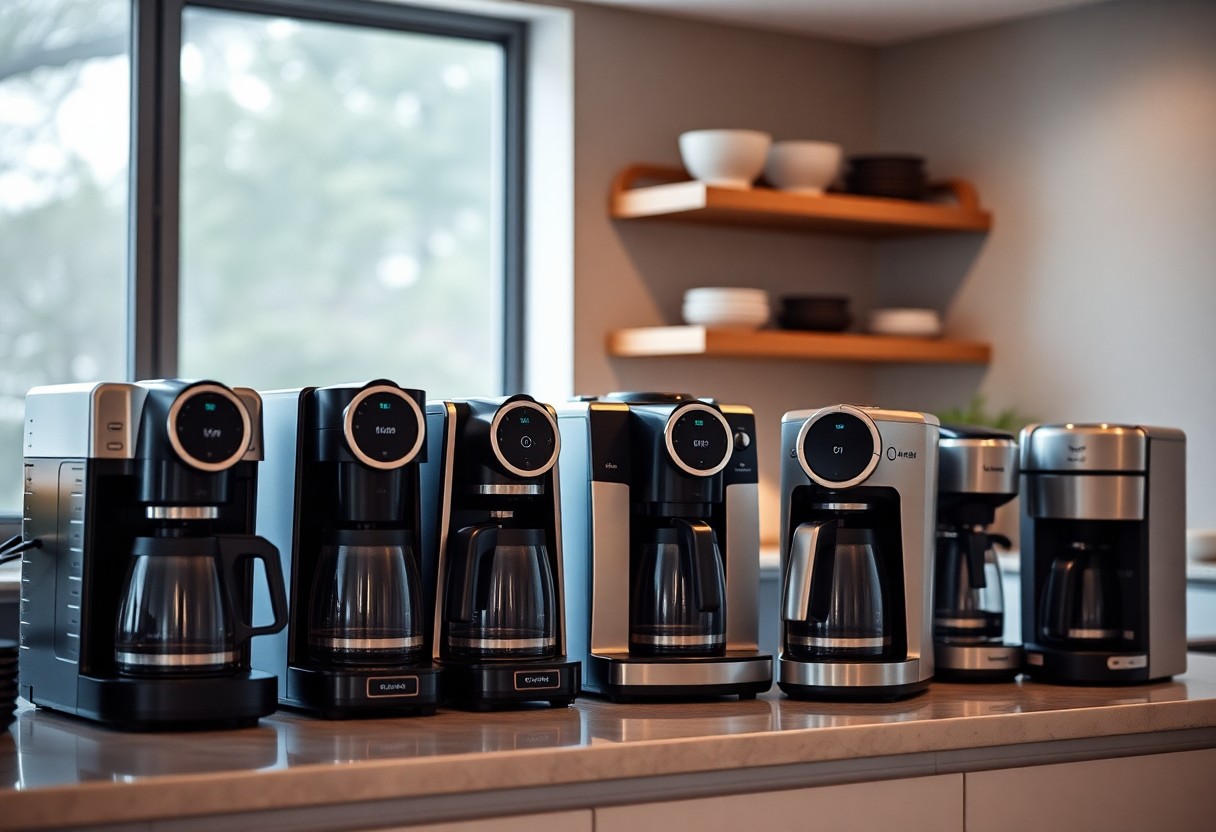
User Experience: Navigating Complexity and Convenience
Your coffee machine should seamlessly fit into your lifestyle, balancing advanced features with ease of use. A machine that requires a complex setup or intricate operation can deter daily use, whereas user-friendly designs promote regular enjoyment of your favorite brews. Evaluate the interface and functions to find a model that aligns with your coffee preferences, ensuring that brewing your perfect cup remains a delightful part of your routine.
Ease of Use: Controls and Automation
Intuitive controls and automation features can significantly enhance your coffee-making experience. Look for machines with digital displays, simplified buttons, or touchscreens to streamline the brewing process. Models equipped with programmable settings allow you to customize your coffee strength and temperature, while others may even deliver a one-touch brew, making early mornings a bit easier.
Maintenance and Cleaning: Keeping It Fresh
Sustaining the quality of your coffee depends heavily on the machine’s maintenance and cleaning requirements. Machines with removable brew groups or dishwasher-safe components make cleaning straightforward, while others may require more effort and specialized cleaning solutions.
Regular maintenance not only prolongs the life of your coffee machine but also ensures that you’re enjoying the freshest taste possible. Consider models with built-in cleaning cycles or alerts that notify you when it’s time to descale. Many advanced machines offer conveniences like automatic rinsing and self-cleaning features that save you time and effort. Keeping your machine in pristine condition enhances flavor and aroma, so prioritizing ease of cleaning is imperative in your choice.
Budgeting for Your Brew: Understanding Price Points
Setting a budget for your coffee machine is vital, as prices range from under $30 to well over $1,000. Determining your budget early on helps narrow down options and ensures you invest in a machine that meets your coffee needs without unnecessary spending. Consider the long-term value of reliable performance versus the initial price tag. Elements such as build quality, warranty, and additional features can make a significant difference in overall satisfaction over time.
Comparing Entry-Level to High-End Models
| Entry-Level Models | High-End Models |
| Price Range: $20 – $150 | Price Range: $500 – $3,000+ |
| Basic functionality | Advanced features (smart technology, customizable settings) |
| Usually less durable | Built with high-quality materials, often repairable |
| Ideal for casual drinkers | Preferred by coffee aficionados |
Evaluating Value Beyond the Price Tag
Looking beyond the price tag requires an assessment of various factors including longevity, warranty offerings, and user reviews. An inexpensive machine may save you money upfront but could lead to additional costs through replacements, repairs, or inferior coffee quality. On the other hand, a higher price might justify its cost with superior features, efficiency, and durability. For instance, a well-rated mid-range machine could last longer and produce better coffee than a poorly made high-end model, proving that you should weigh potential performance against monetary investment.
Desirable Extras: Enhancements That Elevate Your Coffee Game
Adding some desirable extras to your coffee machine can significantly enhance your brewing experience. Features like integrated grinders, milk frothers, and smart technology can transform a simple cup of coffee into a gourmet experience. These enhancements not only boost convenience but also expand the variety of coffee beverages you can enjoy at home, making each sip that much more satisfying.
Integrated Grinders and Milk Frothers
Investing in a coffee machine that includes an integrated grinder allows you to extract maximum flavor from freshly ground beans, tailoring your coffee to your specific taste preferences. Likewise, a built-in milk frother offers the ability to create creamy lattes and cappuccinos right at home, saving time and enhancing the quality of your drinks. These features streamline the brewing process while keeping the quality consistent.
Smart Technology and Connectivity Features
Machines equipped with smart technology allow for an unparalleled level of control and convenience. From remote brewing via smartphone apps to programmable settings tailored to your taste, these features bring your coffee experience into the modern age. You can even schedule brews for those early mornings when every minute counts.
Smart technology goes beyond mere convenience; some machines offer compatibility with voice-assistants, allowing you to manage your brewing through simple commands. Moreover, many models connect to your home Wi-Fi, providing updates on your coffee inventory and enabling recipes and adjustments right from your phone. It’s like having a personal barista in your kitchen, helping you unlock the full potential of your coffee-making skills.
Final Words
Now that you are equipped with vital purchase criteria for buying a coffee machine, focus on features that align with your lifestyle and preferences. Consider factors such as brewing method, size, ease of use, maintenance, and your budget. Whether you prioritize convenience, flavor, or versatility, taking the time to evaluate these elements will ensure you invest in a coffee machine that enhances your daily coffee experience and suits your needs perfectly.
FAQ
Q1: What features should I prioritize when choosing a coffee machine?
A: When identifying a coffee machine, consider the type of coffee you enjoy the most, such as espresso, drip, or single-serve. Look for machines that offer customizable settings for brew strength, temperature control, and the option to use different brewing methods. Additionally, features like programmable timers, built-in grinders, and milk frothers can enhance your coffee-making experience.
Q2: How does the size of the coffee machine impact my decision?
A: The size of the coffee machine should align with your kitchen space and coffee consumption habits. If you have limited counter space or plan to store the machine in a cabinet, a compact model may be suitable. Conversely, larger machines often have higher capacities and more features but may occupy significant counter space. Assess your needs and available space before making a decision.
Q3: What type of coffee machine maintenance should I consider?
A: Maintenance requirements can vary significantly between different types of coffee machines. Drip coffee makers typically require regular cleaning of the brewing components, while espresso machines may need descaling to prevent mineral buildup. Consider models with self-cleaning features or those that are easy to disassemble for cleaning. Read user reviews to gauge the ease of maintenance for any machine you are considering.
Q4: Are there specific brands known for quality coffee machines?
A: Yes, several brands are well-known for their quality and reliability in coffee machines. Brands like Breville, De’Longhi, Cuisinart, and Keurig have built a reputation for producing excellent machines across various types, from single-serve to espresso makers. It can be helpful to research customer reviews and ratings to determine which brands consistently deliver quality products and customer service.
Q5: What is the price range I should expect for a decent coffee machine?
A: Coffee machines come in a wide price range, typically starting around $30 for basic models and going up to several thousand dollars for high-end machines with advanced features. A mid-range machine generally offers a good balance of quality and functionality, usually priced between $100 and $300. Consider your budget and how much you value specific features when making your choice.

